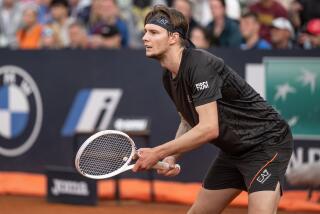McEnroe Logic May Be a Case of Double Vision
- Share via
It’s just like old times when John McEnroe talks tennis. One carefully chosen question, and it’s a race to see if reporters’ pens can keep up with McEnroe’s observations.
In town last week to play in an event on the over-35 tour, McEnroe again made salient points about an institution he dearly loves, alone it seems--the Davis Cup. He sees no excuse for top American players to beg off Davis Cup, as recently happened when the defending champions lost to the Czech Republic.
“There is no explanation for it, none,” McEnroe said. “It’s a disgusting situation. What else are they doing? Making money, playing exhibitions? I don’t understand it.”
McEnroe has refined his ability to analyze the game, perhaps as a result of his work as a television commentator. But his keen logic seems to break down when it involves self-analysis. Witness his comments about his desire to be a member of the Olympic tennis team, as a doubles player.
“Who’s better than me in doubles?” McEnroe said. “I don’t see anyone out there who’s better than me in doubles. If I play a couple of events, I’ll be ready.”
McEnroe apparently hasn’t studied the Olympic situation. The Olympic tennis team is selected according to the world rankings that come out Monday. Period. Olympic coaches have no leeway to select on a basis other than ranking of players available. They may skip past high-ranked players who don’t want to play, such as Michael Chang, or injured players.
Olympic Coach Tom Gullikson couldn’t pick McEnroe if he wanted to. The problem isn’t that McEnroe has a low ranking in doubles (see the case of Jennifer Capriati below), it’s that he doesn’t have a ranking. Since 1992, the last time he played something like a full-time doubles schedule, McEnroe has played one doubles match on the ATP Tour, at Rotterdam in February 1994.
Playing the occasional match on the over-35 tour does nothing to prepare him for what the game is like on the real tour. Even a talent as prodigious as McEnroe’s needs more honing than that.
As to who’s a better doubles player, how about his own brother, Patrick? The younger McEnroe was deemed good enough to play doubles on the Davis Cup team. So was Patrick Galbraith, the 1995 world doubles champion and ranked No. 5 in the world.
McEnroe has a beef about the way he was treated in 1992 regarding the Olympics. He said he always made it clear he wanted to play, preferring to play singles. Somehow, he said, it came out that he would not play doubles and McEnroe was not selected for the team.
He is resigned to his lot this time.
“Am I expecting to go to the Olympics? No,” McEnroe said.
Good observation.
*
Just when we were about to note that the women seldom have trouble getting top players for Fed Cup comes the news that Arantxa Sanchez Vicario and Conchita Martinez held a weeklong sit-in, refusing to help Spain defend its title because of the $55,000 they are paid per match. They were asking for $80,000 and settled for an undisclosed sum.
Still, it’s unusual for anyone to rock the Fed Cup boat. The drill for the women during Fed Cup weeks is the same as the men during Davis Cup--no top-tier tournaments are scheduled. Just about all the top women support Fed Cup--Steffi Graf is a recent exception. The Americans have been pretty good about it, when they are healthy. For the recent match against Austria, the U.S. team was without Monica Seles, Lindsay Davenport and Chanda Rubin, all injured.
Jennifer Capriati was named as a last-minute replacement, cut short her vacation in the Caribbean and flew to Salzburg. All of which prompted Fed Cup captain Billie Jean King to muse aloud about the possibility that Capriati might get a special dispensation that would enable her to defend her Olympic title.
King, also the Olympic coach, said that because Capriati has only recently returned to the WTA tour, she does not have a high enough ranking to justify her placement on the team. However, King suggested Capriati be named as a wild card. There are 48 direct acceptances into the Olympic tournament and 16 wild cards. However, no country may have more than three singles players; if Capriati is to defend her singles title, she’d have to displace someone ranked above her.
King said she would not bump a higher-ranked American off the team in favor of Capriati but that she has talked with the USTA and asked that the International Tennis Federation consider Capriati’s case.
“As host country this year and her being the defending gold medalist, I have asked for her to be an exception,” King said. “The chances are slim, but I’m in her corner.”
*
It was a heck of a week at the Bermuda Open for Bill Behrens of Rancho Palos Verdes. The former UCLA player won three matches in qualifying to make it into the main draw. His play was a study in resilience.
In his first match in qualifying, Behrens played his doubles partner, Brett Hansen-Dent. He was down a service break but came back to win. Behrens’ match in qualifying against Jaime Oncins in high humidity took its toll on both players. Behrens was so racked with cramps, he could barely move on the court and began to serve underhanded. Oncins, too, was suffering. He had trouble breathing because of an asthma attack.
Behrens drew eighth-seeded Scott Draper in his first match in the main draw. The match went 2 hours 50 minutes, the longest of the tournament. Behrens’ win was his first singles victory on the ATP Tour. He then beat Jan Apell, who twice served for the match.
Behrens’ streak was ended against MaliVai Washington, who went on to win the tournament. Behrens’ ranking went from No. 707 at the beginning of the week to No. 404.
More to Read
Go beyond the scoreboard
Get the latest on L.A.'s teams in the daily Sports Report newsletter.
You may occasionally receive promotional content from the Los Angeles Times.







